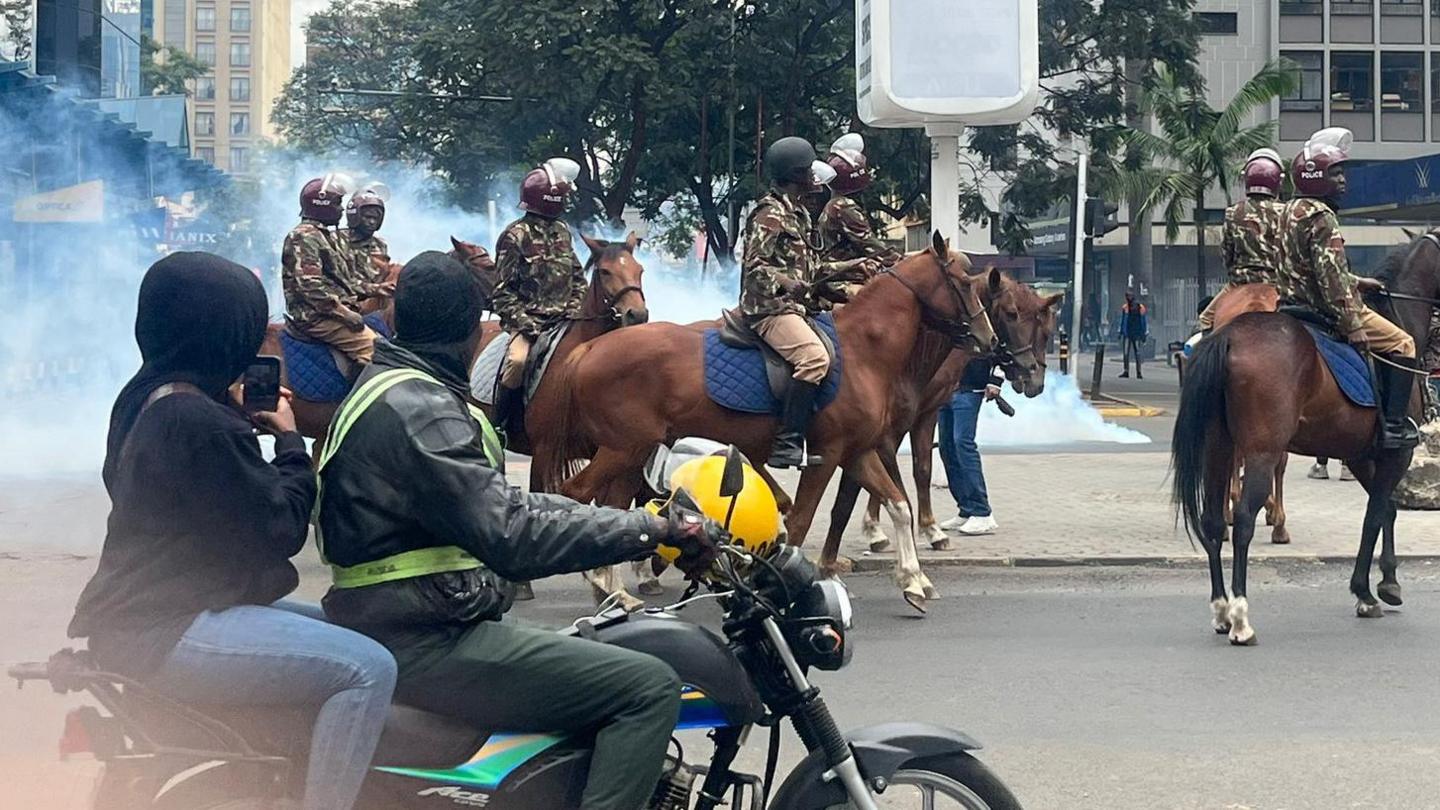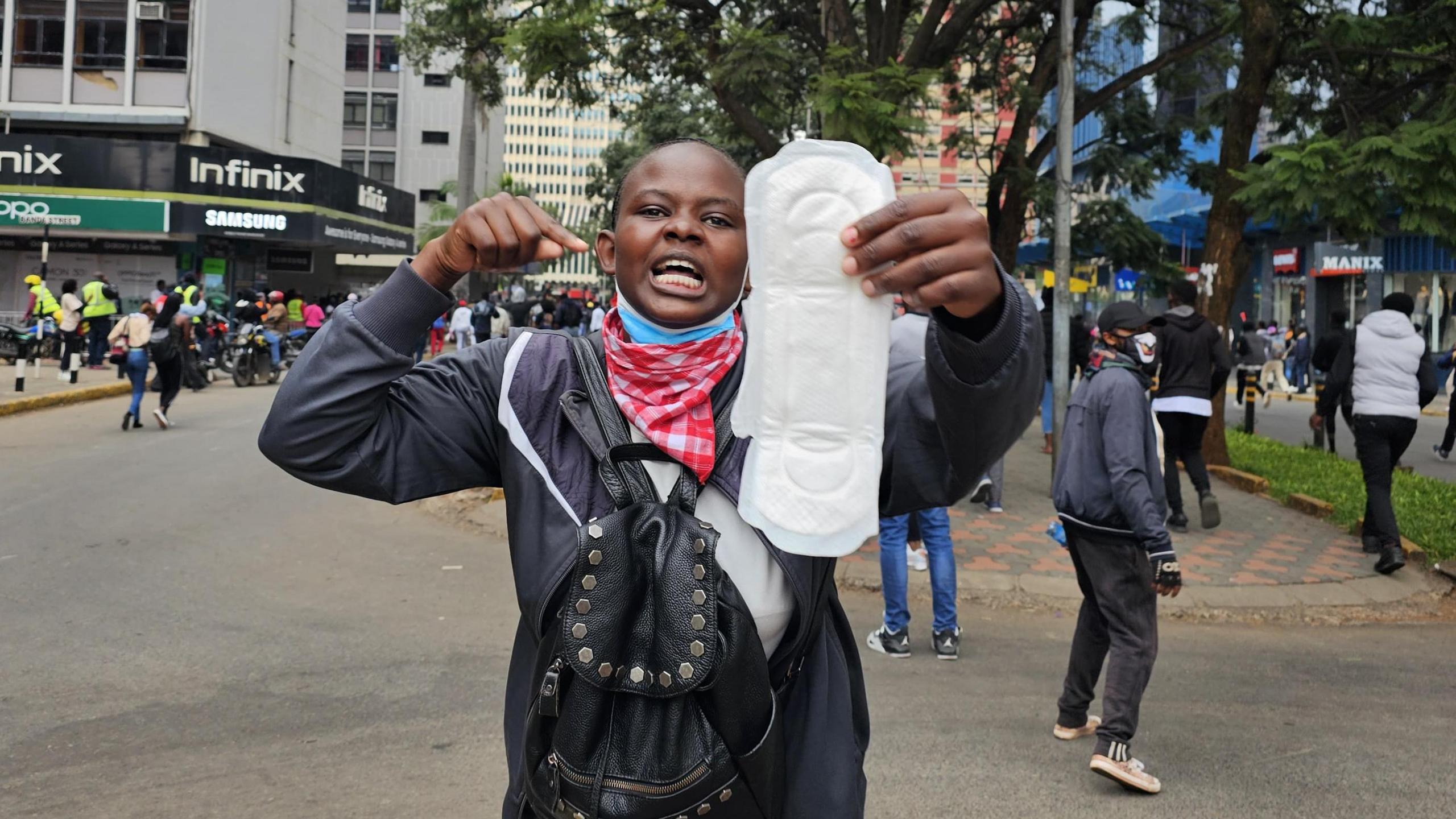Police battle anti-tax demonstrators as Kenya protests spread

The protests have not been organised by politicians
- Published
Kenyan police have clashed with anti-tax protesters in the capital, Nairobi, as demonstrations have spread across the country, including to the president’s home town of Eldoret.
Anti-riot police, some on horseback, fired tear gas to disperse crowds of protesters on the streets of Nairobi.
There were similar protests in other cities and major towns across the country - including Nakuru, Eldoret, Kisumu and Nyeri.
There is a palpable anger among many Kenyans over a controversial finance bill that has introduced a number of unpopular tax proposals.
Despite the complaints, the controversial bill was passed by a majority of MPs during the second reading stage. It will now go on to the next stage where a committee will consider amendments related to the proposed taxes.
As the protests started on Tuesday, the public outcry forced the government to withdraw some of contentious provisions, including a 16% tax on bread and an annual 2.5% tax on vehicles.
But protesters say this is not enough and have demanded that legislators, who are currently debating the bill in parliament, to reject the entire bill.
“I dropped out of college as my parents couldn’t afford my education. I’m hustling to go back and now you want to take the little I make and make me not even buy sanitary pads?” Aristaricus Irolo, 26, told the BBC in the capital, while holding a pad, which is among the items affected by the proposed tax rises.

Aristaricus Irolo says she cannot afford sanitary pads
Fifty-six-year-old Mumbi Muturi said she had come to support her daughter and niece, both 25, who were protesting.
"We [her generation] did not come out to protest when we should have. I am not worried about these ones. They are securing their future. I am here to support them," she said.
Unlike in the past, the current protests are being driven by young people rather than politicians and have mostly been peaceful.
There have been intense rallying calls on social media using the hashtag #OccupyParliament and #RejectFinanceBill2024, urging Kenyans to keep vigil as members of parliament debate the bill.
It has also involved young professionals including doctors and lawyers, who are offering services to the protesters.
“My younger Gen Z colleagues here getting ready for dispatch to attend to any protester in need of medical attention in Nairobi,” Mercy Korir, a medical doctor, posted on X, formerly Twitter.
In Eldoret, the home area of Mr Ruto, hundreds of protesters brought the city to a standstill as they marched through the streets, some waving placards.
There were protests in some other towns across the country – with the anger over additional taxes uniting many Kenyans beyond their ethnicity and party.
In the central town of Nyeri, protesters chanted: "Ruto must go! and "It's all possible without Ruto".
"We are tired," other protesters said in the western town of Kisii.
Since becoming president in 2022, Mr Ruto has introduced several new and unpopular taxes, which critics say stifle economic growth and lead to job losses.
The government has often defended the tax measures as necessary to reduce the country’s national debt of nearly $80bn (£63bn).
On Wednesday the president said protests were a democratic right but maintained that they would not cripple the government's decision-making process.
Lawyers and rights groups have condemned the police for using excessive force against peaceful protesters, with hundreds of people arrested earlier this week.
Rights groups including Amnesty International jointly said on Thursday they had deployed observers nationwide while warning against use of such force.
More BBC stories on Kenya:

Go to BBCAfrica.com, external for more news from the African continent.
Follow us on Twitter @BBCAfrica, external, on Facebook at BBC Africa, external or on Instagram at bbcafrica, external